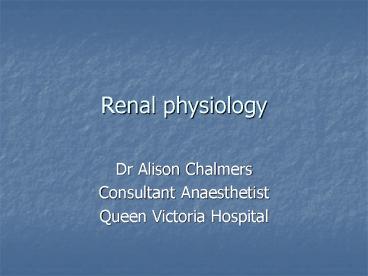Renal physiology - PowerPoint PPT Presentation
1 / 21
Title:
Renal physiology
Description:
Renal physiology Dr Alison Chalmers Consultant Anaesthetist Queen Victoria Hospital What you need to know Blood flow, glomerular filtration and plasma clearance ... – PowerPoint PPT presentation
Number of Views:326
Avg rating:3.0/5.0
Title: Renal physiology
1
Renal physiology
- Dr Alison Chalmers
- Consultant Anaesthetist
- Queen Victoria Hospital
2
What you need to know
- Blood flow, glomerular filtration and plasma
clearance - Tubular function and urine formation
- Assessment of renal function
- Regulation of fluid and electrolyte balance
- Regulation of acid base balance
- Micturition
- Pathophysiology of acute renal failure
3
Example questions from SOE 1
- Buffers what are they, how are they classified,
formation of bicarbonate, how is H eliminated - Fluid balance regulation of fluid balance, what
happens when you infuse saline - Renal renal blood flow, factors affecting GFR,
autoregulation, tuberoglomerular feedback,
measurement of GFR/RBF
4
Aims of this session
- Key facts about the kidney function, anatomy
- Renal blood flow
- Glomerular filtration and tubular function
- Regulation of body fluid volume and electrolyte
balance - Renal regulation of acid base balance
- Micturition
5
Key facts function of the kidney
- Electrolyte and water homeostasis
- Acid-base homeostasis
- Excretion of waste products and toxins
- Calcium and phosphate homeostasis
- Endocrine functions erythropoietin
- Retention of vital substances glucose, proteins
6
Key facts - anatomy
7
Renal blood flow
- Receives 20 cardiac output
- Cortex gt outer medulla gt inner medulla
- 2 capillary beds in series
- RBF RPF x 100/55
- PAH clearance used to measure RPF
8
Regulation of renal blood flow
- Autoregulation
- Renin-angiotensin system
- Macula densa cells
- Juxtaglomerular complex
9
Glomerular filtration
- GFR 125ml/min
- Approx 20 renal blood flow is filtered
- GFR forces favouring filtration forces
opposing filtration
10
Factors affecting GFR
- Forces favouring filtration
- PG hydrostatic pressure in glomerular capillary
- ?B colloid osmotic pressure in Bowmans capsule
- Forces opposing filtration
- PB hydrostatic pressure in Bowmans capsule
- ?G colloid osmotic pressure in glomerular
capillary - GFR PG (PB ?G)
- Molecular size charge and size
- Inulin clearance used to measure GFR (or Cr cl
GFR)
11
Tubular function
12
Proximal tubule
- Passive diffusion
- Across membrane
- Through channels/pores
- Facilitated diffusion
- Active transport
- Secretary processes
- Organic acids/bases
13
Sodium reabsorption
- Passive diffusion
- Na linked symport and antiport
- NaKATPase into LIS
14
Bicarbonate reabsorption
- Reabsorption occurs as a result of H secretion
into the tubular lumen
15
Loop of Henle
16
Distal tubule and collecting duct
- Distal tubule
- Final reabsorption of ions
- Collecting duct
- Variable permeability to water depending on ADH
present - Urea diffuses from collecting duct to aid in the
concentrating of urine under influence of ADH
17
Fluid and electrolyte balance
Angiotensinogen
Na depletion
Renin
Decrease blood volume
Angiotensin I
ACE
Increase BP
Angiotensin II
Decrease blood pressure
Na retention Increase blood vol
Aldosterone
Increase ADH Decrease ANP
18
Renal control of acid base balance
- Key reaction
- CO2 H2O ltgt H2CO3 ltgt H HCO3-
- Rate of H secretion inversely proportional with
pH - Respiratory acidosis
- ?CO2 ? ? rate of H secretion in kidney ? ?
HCO3- reabsorption renal compensation - Metabolic acidosis
- Change in pH detected by peripheral
chemoreceptors - ? ventilation rate respiratory compensation
- ? H secretion in kidney ? ? HCO3- reabsorption
renal correction
19
Micturition
- Detrusor muscle smooth muscle
- 2 sphincters
- Internal smooth muscle
- External skeletal muscle
- Spinal reflex with learned voluntary control
20
Any questions?
21
Summary
- Key facts about the kidney function, anatomy
- Renal blood flow
- Glomerular filtration and tubular function
- Regulation of body fluid volume and electrolyte
balance - Renal regulation of acid base balance
- Micturition































